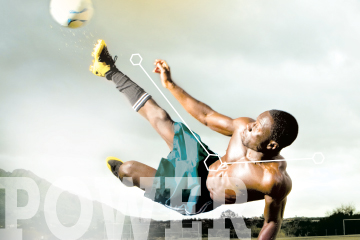 Vitamins and minerals play many roles in an athlete’s body including energy production and the maintenance of tissues, bone, and immune function. Exercise stresses many of the biochemical pathways where micronutrients are required, increasing the turnover and loss of these nutrients. Thus athletes may have greater requirements for these micronutrients in order to adequately build and repair muscles and maintain normal physiological function. Discover some of the most common nutrients athletes are lacking: calcium, vitamin D, B vitamins, iron, zinc, chromium and magnesium.1
Vitamins and minerals play many roles in an athlete’s body including energy production and the maintenance of tissues, bone, and immune function. Exercise stresses many of the biochemical pathways where micronutrients are required, increasing the turnover and loss of these nutrients. Thus athletes may have greater requirements for these micronutrients in order to adequately build and repair muscles and maintain normal physiological function. Discover some of the most common nutrients athletes are lacking: calcium, vitamin D, B vitamins, iron, zinc, chromium and magnesium.1
CALCIUM AND VITAMIN D– Partners in Bone Health
Strong bones are integral to athletic training and performance—they provide a strong and rigid frame for muscles. Without the right nutrition, the structure of bone can be compromised and put athletes at risk for weak bones, stress fractures and osteoporosis. In addition to adequate calories and protein in the diet, calcium and vitamin D are key players in maintaining bone health. Research suggests that athletes who live at northern latitudes, where there is less sun exposure, or who train primarily indoors throughout the year, such as gymnasts and figure skaters, are particularly at risk for poor vitamin D status and would benefit from eating fortified foods or supplementing with vitamin D.2
B VITAMINS–For Optimal Energy Production and Muscle Synthesis
B-vitamins are involved in the metabolism of food for energy as well the production of red blood cells, muscle protein synthesis, and tissue repair and maintenance.3 Some data suggest that exercise may increase the need for these vitamins by as much as twice the current recommended amount.4 While most athletes are able to consume enough B vitamins if they meet their energy requirements through nutrient-dense foods, those who do not get enough B vitamins could develop severe deficiencies that negatively impact energy metabolism. Health authorities caution that severe deficiency of vitamin B12 and folate may result in anemia and reduced endurance.2 Therefore, it is important that athletes consume adequate amounts of these micronutrients to support their efforts for optimal performance and health.
 KEY MINERALS: ZINC, MAGNESIUM, CHROMIUM, AND IRON
KEY MINERALS: ZINC, MAGNESIUM, CHROMIUM, AND IRON
Minerals do not provide energy directly to a cell. Instead, they play a critical role in the diet of athletes by acting as cofactors (non-protein chemical compounds that assist in biochemical transformations) for the enzymes involved in energy metabolism. Our cells have daily requirements for all minerals. But in an exercised state, these requirements are amplified. Athletes are in danger of inadequate mineral nutritional status when they do not have adequate food intakes, or when restricting their diets to lose weight or ‘get in shape’ for athletic competitions. This impaired mineral status can be realized as feeling tired, sluggish athletic performance, and slower than normal recovery. There are a few critical ones that athletes should pay close attention to:
Zinc plays a role in growth, building and repair of muscle tissue, energy production, and immune status. Data show that individuals with poor zinc levels experience decreases in cardiorespiratory function, muscle strength, and endurance, all of which can negatively affect health and physical performance.3
Magnesium plays a variety of roles in cellular metabolism and regulates membrane stability, cardiovascular, immune, and hormonal functions.3 A deficiency of magnesium can impair the ability to participate in endurance activities by causing the body to need more oxygen to complete the exercise.
Chromium is an essential mineral that plays a role in how insulin, a hormone that helps balance blood sugar levels, works in the body. Studies have suggested that chromium helps increase insulin sensitivity, which makes insulin more effective in removing excess sugar from the blood stream to be used for later.5 Keeping blood sugar levels relatively stable is important for athletes so they have a steady supply of blood glucose to fuel their workout.
 Iron is required for the formation of hemoglobin and myoglobin (proteins in the blood and muscle cell responsible for transporting oxygen) and for enzymes involved in energy production, all of which are especially important for individuals participating in endurance-type activities. Adequate iron levels are associated with improved work capacity and endurance, increased oxygen uptake, reduced lactate concentrations, and reduced muscle fatigue.3 Individuals particularly at risk for low iron stores include female athletes, individuals who have inadequate energy intake, vegetarians, those experiencing periods of rapid growth (adolescents), and those who train at high altitudes, regularly donate blood, or experience blood loss.1 Supplementation is recommended for those with anemia, but there is some evidence that athletes who are iron-deficient, but do not yet have anemia, may also benefit from iron supplementation.1
Iron is required for the formation of hemoglobin and myoglobin (proteins in the blood and muscle cell responsible for transporting oxygen) and for enzymes involved in energy production, all of which are especially important for individuals participating in endurance-type activities. Adequate iron levels are associated with improved work capacity and endurance, increased oxygen uptake, reduced lactate concentrations, and reduced muscle fatigue.3 Individuals particularly at risk for low iron stores include female athletes, individuals who have inadequate energy intake, vegetarians, those experiencing periods of rapid growth (adolescents), and those who train at high altitudes, regularly donate blood, or experience blood loss.1 Supplementation is recommended for those with anemia, but there is some evidence that athletes who are iron-deficient, but do not yet have anemia, may also benefit from iron supplementation.1
In summary, athletic performance relies on optimal nutrition status. Particularly during high-intensity training, insufficient diets will lead to poor performance, fatigue, increased risk of injury, and negative effects on bone health, cognitive function, immunity, and even reproductive function. Getting the right nutrition throughout your exercise program is vital not only for making the gains and progress necessary to improve fitness and performance, but also for sustaining the normal physiological functions necessary to help you thrive.
For more information on NeoLife SPORT and other products, please visit neolifeclub.com or call 800.432.5842. To learn how to build a foundation of good nutrition for you and your loved ones, visit shareneolife.com.
References
1. Rodriguez NR, et al. Position of the American Dietetic Association, Dietitians of Canada, and the American College of Sports Medicine: Nutrition and athletic performance. J Am Diet Assoc. 2009 Mar;109(3):509-27.
2. Meier C, et al. Supplementation with oral vitamin D3 and calcium during winter prevents seasonal bone loss: a randomized controlled open-label prospective trial. J Bone Miner Res. 2004 Aug;19(8):1221-30. Epub 2004 May 24.
3. Lukaski HC. Vitamin and mineral status: effects on physical performance. Nutrition. 2004 Jul-Aug;20(7-8):632-44.
4. Woolf K, Manore MM.B-vitamins and exercise: does exercise alter requirements? Int J Sport Nutr Exerc Metab. 2006 Oct;16(5):453-84.
5. Cefalu WT, Hu FB. Role of chromium in human health and in diabetes. Diabetes Care. 2004 Nov;27(11):2741-2751.
